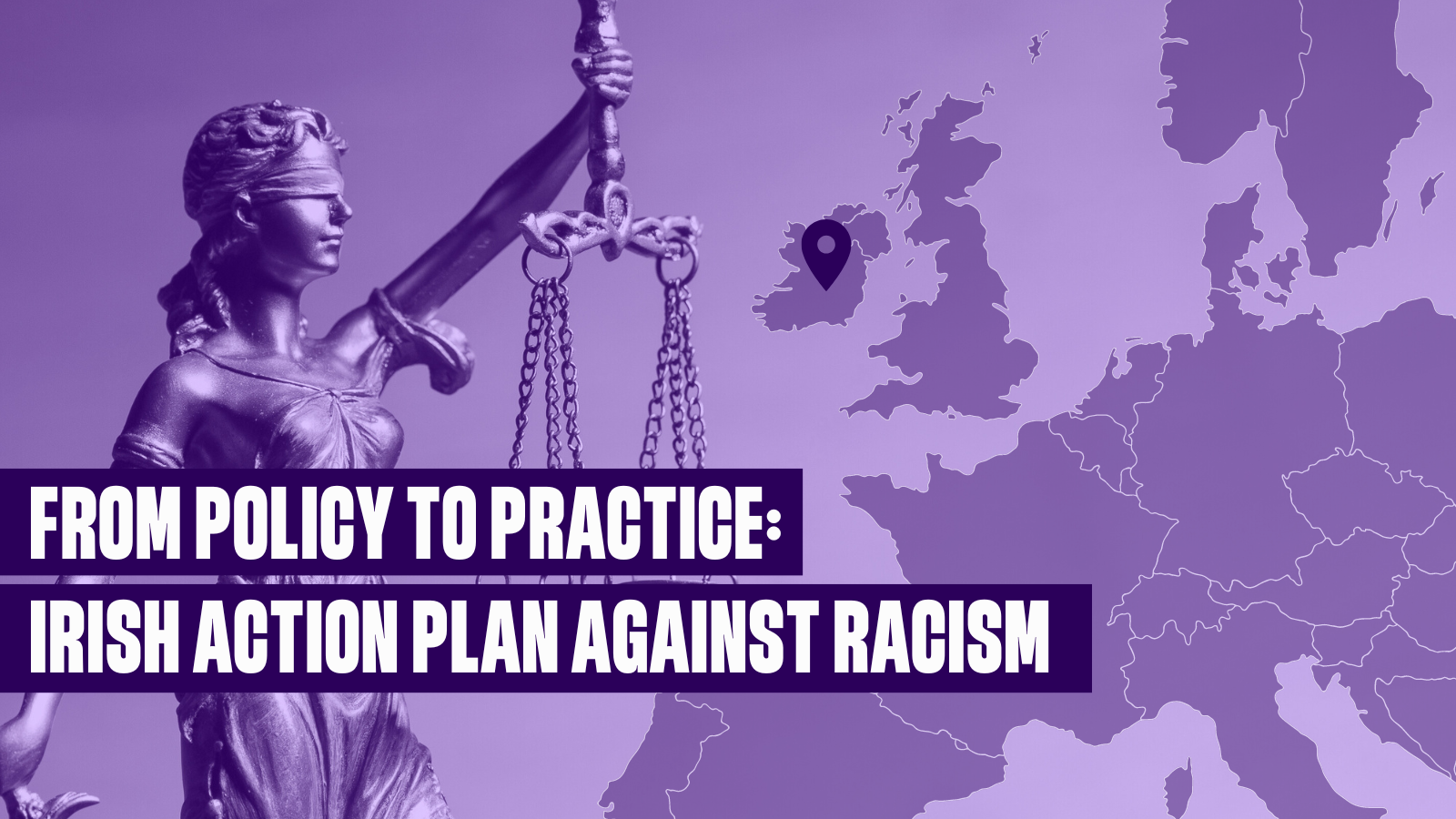
Anti-Racism Map: Mapping Anti-Racism Plans in Ireland
In ENAR’s Evaluation of the National Action Plans against Racism, Ireland scored 9/20. There is currently no National Action Plan against Racism, although it is planned.
Overview
| Category | Score |
|---|---|
| 1. NAPAR Adoption | 2/4 |
| 2. Systemic and Intersectional Approach | 2/3 |
| 3. Equality Data Collection | 2/4 |
| 4. Institutional Participatory Mechanisms | 1/3 |
| 5. Human and Financial Resource Allocation | 1/3 |
| 6. Civil Society Coalition | 1/3 |
| Total Score | 9/20 |
Explanations and Sources
The assessment is based on independent research carried out for the European Network Against Racism by Patricia Munatsi from the Irish Network Against Racism (INAR). Below are the explanations and sources that support these assessments.
1. NAPAR Adoption
There is no National Action Plan in Ireland yet, but an action plan was developed by the Anti-Racism Committee in 2022, and accepted by the Minister for Equality. It is yet to be adopted by the Government and Parliament.
The final copy of the national action plan is not accessible to the public, what is available to the public is the Consultation Report and the Interim Report on the NAPAR. There is no clear document adopted by the Government to support the implementation of the plan.
See also:
- The Irish Government made a commitment to draw up a National Action Plan Against Racism.
- Consultation Report
- Anti-Racism Interim Report
- Press Release on the Interim Report of the Anti-Racism Committee and the Launch of Public Consultation
2. Addressing Systemic Racism and Intersectionality
In regard to the definition of structural racism adopted by Ireland, there is a definition of racism as systemic in the Anti-Racism Committee’s Interim Report which INAR believes made it into the final version of the National Action Plan Against Racism, yet to be adopted by the Government of Ireland.
In the Interim Report, racism is understood to mean ‘the power dynamics present in those structural and institutional arrangements, practices, policies, and cultural norms, which have the effect of excluding or discriminating against individuals or groups, based on their identity,’ as outlined in Article 1 of the International Convention for the Elimination of Racial Discrimination (ICERD).
The Interim Report acknowledges the intersectionality between racism and all other forms of oppression, including the oppression experienced by people based on gender, sexuality, gender identity, disability, and socio-economic circumstances. It further acknowledges that women, children, and men experience dimensions of racism differently.
There are strong measures in the plan aimed at addressing structural racism but lack an implementation plan and clear indicators to measure the effectiveness of the plan. These measures are, among others, in the fields of Policing and the Justice System, Education, Health, Employment, Housing, and Accommodation.
3. Equality Data Collection
In the current Anti-Racism Committee’s Interim Report on the NAPAR, there are data collection initiatives to tackle racism and racial inequalities. However, some of the indicators in the plan are not going to be disaggregated by race or ethnicity which significantly weakens the ability to measure progress in addressing inequalities.
The State has made a commitment to the collection of data disaggregated by race and ethnicity. In March 2022, marking the International Day Against Racism, Minister for Children, Equality, Disability, Integration and Youth, Roderic O’Gorman, has announced the development of a National Equality Data Strategy.
The National Equality Data Strategy is being developed by the Central Statistics Office and the Department of Children, Equality, Disability, Integration and Youth and will put in place a strategic approach to improving the collection, use and dissemination of equality data. It is intended that the Strategy will be in place in 2023.
4. Institutional Participatory Mechanisms
There is no permanent participatory mechanism or body in Ireland. However, in the ongoing process for a National Action Plan, there will be an Advisory Committee on Racial Equality and Racism. The Committee will comprise of no more than eight members who have knowledge and expertise in matters related to racial equality and racism.
The Committee is to be chaired by a Special Rapporteur on racism. Its membership is to include individuals with lived experiences of racism and representative organisation. It is important to note here that the final copy of the Action Plan has not been made available to the public and still awaits Government adoption.
5. Human and Financial Resource Allocation
There is no budget dedicated to the implementation of the National Action Plan Against Racism. The lack of human and financial resources is one of the criticisms raised by the Irish Network Against Racism (INAR) on various forums.
Since the publication of the Anti-Racism Committee’s Interim Report, the issue of resourcing has been left unresolved and is one of the major weaknesses of the current plan as it stands. No information is available on how many people will be working on the action plan from the Government side. The plan does also not include resourcing for monitoring mechanisms for the NAPAR.
6. Civil Society Coalition Advocating for NAPAR
There is currently no civil society coalition, only individual organisations advocating for the NAPAR, including the Irish Network Against Racism (INAR) and its network membership of 178 organisations. However, INAR and its network membership intend to establish a Civil Society Coalition for the implementation of the NAPAR in the first quarter of 2023.
The research was carried out by Patricia Munatsi from the Irish Network Against Racism in March 2023.



